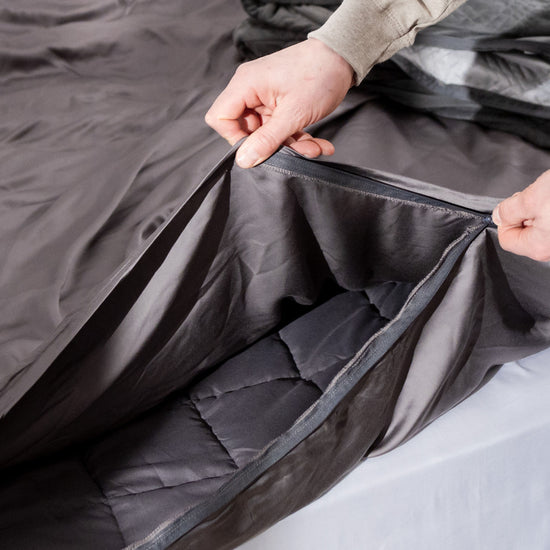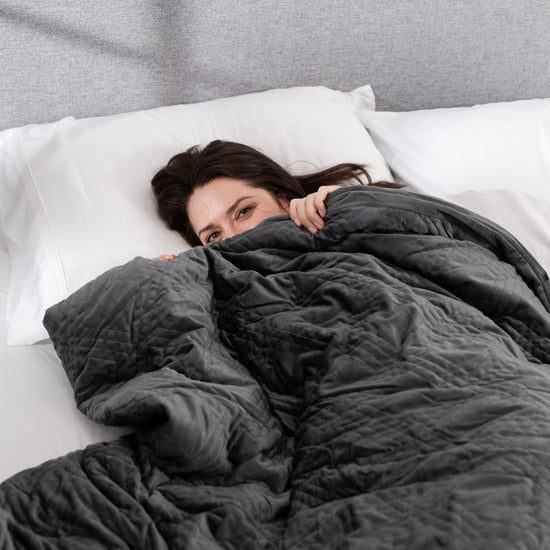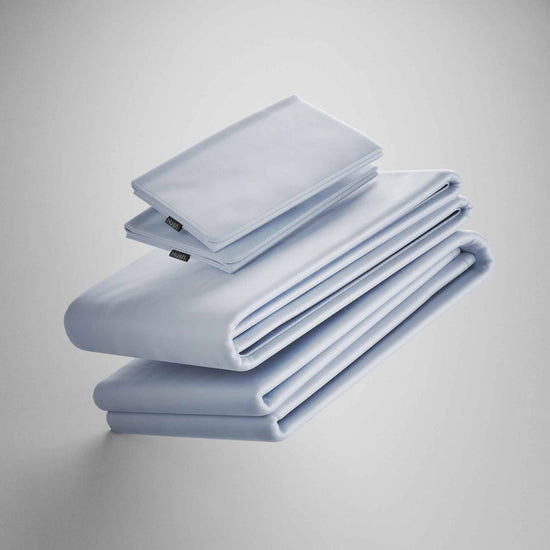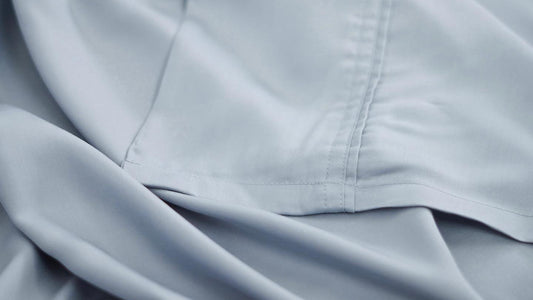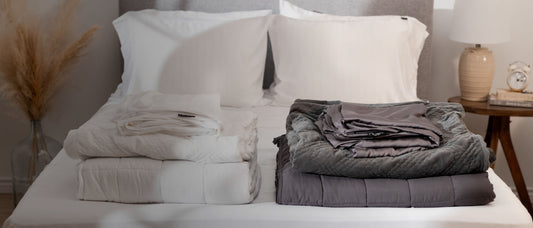Weighted blankets are becoming more and more popular among people with epilepsy or who experience seizures. Specifically, these blankets are supposed to help you sleep better, stave off seizures, and promote calm and recovery when seizures do happen.
But does the science back up the use of weighted blankets for seizures and epilepsy? It’s hard to say for sure.
Weighted blankets are a relatively new therapy, so little scientific research has been conducted on how they affect seizures. Still, there are logical reasons weighted blankets could work for seizures, and given how popular these blankets are in epilepsy forums and communities, they’re worth a closer look. And taking a closer look is what this article is all about.
In this article, we’ll review some of the research on weighted blankets, and look at how they can be connected to epilepsy and seizures. We’ll also take a look at how weighted blankets work, and touch on some of the best options you’ll find if you’re interested in trying one for yourself.
Note: If you’d like to test a weighted blanket for yourself, we offer a 100-night sleep trial on all our weighted blankets at Hush. You’ll get an overview of the science below, but your personal experience may vary, so we encourage you to take advantage of our trial and see if a weighted blanket will work for you.
At a glance:
The Research Behind Weighted Blankets and Seizures or Epilepsy

To start let’s get into the science of how weighted blankets work. Though there aren’t currently scientific studies that specifically test the effects of weighted blankets on those who have seizures or who have been diagnosed with epilepsy, there are some scientific studies that suggest weighted blankets could be helpful for these purposes.
Specifically, we know that weighted blankets help reduce anxiety and insomnia, and relieve muscle tension, all of which can potentially decrease the occurrence of seizures. These effects might not be enough on their own, but they could explain the success stories we hear from epilepsy patients who say weighted blankets help (more on that later).
Weighted Blankets Can Decrease Anxiety
A systematic review on weighted blankets from the American Journal of Occupational Therapy looked at eight studies testing the effects of weighted blankets. Though the authors call for more research, they have enough evidence from the studies reviewed to conclude that weighted blankets can help to reduce anxiety.
Why does this matter? Well, those who deal with seizures and epilepsy may have increased levels of anxiety. An article from Epilepsia says patients with epilepsy are at a higher risk of developing both anxiety and depression. What’s more, anxiety is also a common side effect in many of the medications used to treat seizures.
But what about those with non-epileptic seizures? These may be associated with increased anxiety as well. A study from the Indian Journal of Psychological Medicine explains that psychogenic non-epileptic seizures, or PNES, may happen as a result of anxiety.
The same is true of epileptic seizures. An article from the journal Epilepsy and Behavior that looked at nine personal narratives of patients with epilepsy identifies stress as a common trigger of seizures — something many people with epilepsy already know — and stress is of course very closely related to anxiety.
So, the causal arrow may go both ways: seizures and seizure medications can cause increased anxiety, but anxiety can also cause seizures. With this in mind, having a reliable treatment for anxiety — weighted blankets — makes sense.
Weighted Blankets Can Decrease Insomnia
Sleep and seizures are also closely related. A study from Missouri Medicine explains that sleep deprivation can make seizures more likely. Some sleep disorders are also more likely to develop alongside seizures. So, treating sleep problems may help to decrease the frequency and severity of seizures and symptoms of epilepsy.
Additionally, anxiety and depression are both strongly correlated with insomnia, according to a study from Frontiers in Neurology. As we just saw, patients who deal with seizures may be at a higher risk of developing anxiety or depression, and stress and anxiety in turn can cause more seizures. All these factors make insomnia more likely in patients with seizures or epilepsy.
Thankfully, weighted blankets can help improve sleep in patients with anxiety, depression, or other psychiatric disorders.
A randomized, controlled trial the Journal of Clinical Sleep Medicine split 120 patients with psychiatric disorders into two groups: One group received weighted blankets, and the other group received non-weighted blankets. Participants were unaware which group they were in, and they were told to sleep with their blanket for four weeks.
After four weeks, participants in the weighted blanket group had significantly better sleep, resulting in less daytime drowsiness and higher daytime energy levels. The researchers conclude that weighted blankets can help improve insomnia in those with major depressive disorder, bipolar disorder, generalized anxiety disorder, sensory issues, or attention deficit hyperactivity disorder.
So, weighted blankets can improve insomnia among those who deal with anxiety, depression, and other psychiatric disorders. This includes people with epilepsy or PNES, who are also at an increased risk of anxiety.
Weighted Blankets Create Deep Pressure Stimulation
Weighted blankets have other therapeutic benefits as well. Specifically, weighted blankets push down on your muscles and relieve tension. This creates a comforting sensation sometimes described as a full-body hug, but more than that, it stimulates deep pressure, similar to acupressure.
In so doing, weighted blankets switch the balance from the sympathetic nervous system (the fight-or-flight response) to the parasympathetic nervous system (the rest-and-digest response). This has many beneficial effects, including an increase in “feel good” hormones like oxytocin, which some may find calming after a seizure episode.
Anecdotal Evidence Suggests Weighted Blankets Help with Seizures
While we don’t have direct scientific evidence examining the effects of weighted blankets on seizures, we do have some anecdotal evidence suggesting weighted blankets can reduce the frequency or severity of seizures.
For instance, sources on Reddit and other social media sites claim weighted blankets help with their seizures. Of course, such data is not 100% reliable and should be taken with a grain of salt, but it is in line with what we hear from our customers, and what the science on weighted blankets has shown.
For instance, one individual who has nocturnal tonic clonic (TC) seizures claimed that weighted blankets helped improve this condition, though they also commented that it’s too hot to use standard weighted blankets where they live. (This is where our Hush Iced 2.0 weighted blanket can help!)
Another individual claimed a weighted blanket helped to reduce the amount of time it takes to fall asleep, potentially meaning they experienced fewer seizures. This user pointed out that lack of sleep and anxiety can both trigger seizures, and weighted blankets help with both (as we explained in more detail above).
Others who experience nocturnal seizures say weighted blankets help them sleep better throughout the night, and many users who just have anxiety or insomnia have commented that weighted blankets help them fall asleep faster and have deeper sleep.
Of course, it’s impossible to know if a weighted blanket can truly prevent seizures, since you’ll never know if you would have had a seizure if you hadn’t used a weighted blanket. But given the strong evidence that they improve anxiety and insomnia, they are certainly worth a try, especially since both are correlated with seizures and epilepsy.
Also, there's no risk to trying a weighted blanket since they're safe (they're even used by pregnant women and kids!). And, you can try one at no risk with Hush's 100-night sleep trial.
Hush Weighted Blanket: The Best on the Market

We’ve seen many benefits of weighted blankets and how they may help with seizures and epilepsy, but it’s worth pointing out that there are significant differences between the different brands of weighted blankets. You likely won’t get as many benefits from a poorly-made weighted blanket, whereas a high-quality weighted blanket can make all the difference.
For more information, read our guides on the best weighted blankets and best cooling weighted blankets.
Final Words: More Research Needed, But Weighted Blankets Are Worth a Try
To recap, weighted blankets can potentially reduce the occurrence of seizures among those with epilepsy, or who experience PNES. This is in part because they can reduce stress and anxiety, improve insomnia and other sleep problems, and provide deep pressure stimulation, all of which can alleviate seizures. Some anecdotal evidence confirms these claims.
And if you’re looking for the best weighted blankets on the market, try Hush weighted blankets. Check out the Iced 2.0 duvet cover if you’re a hot sleeper, or the classic if you’re a cold sleeper — or get both if you can’t decide! With our 100 night sleep trial, you can rest assured knowing that if you don’t absolutely love it, you can send it back for a full refund.

